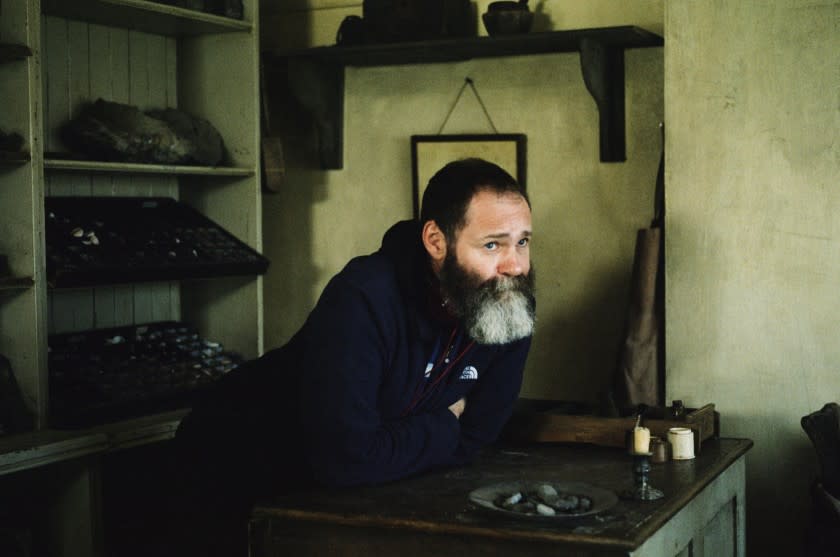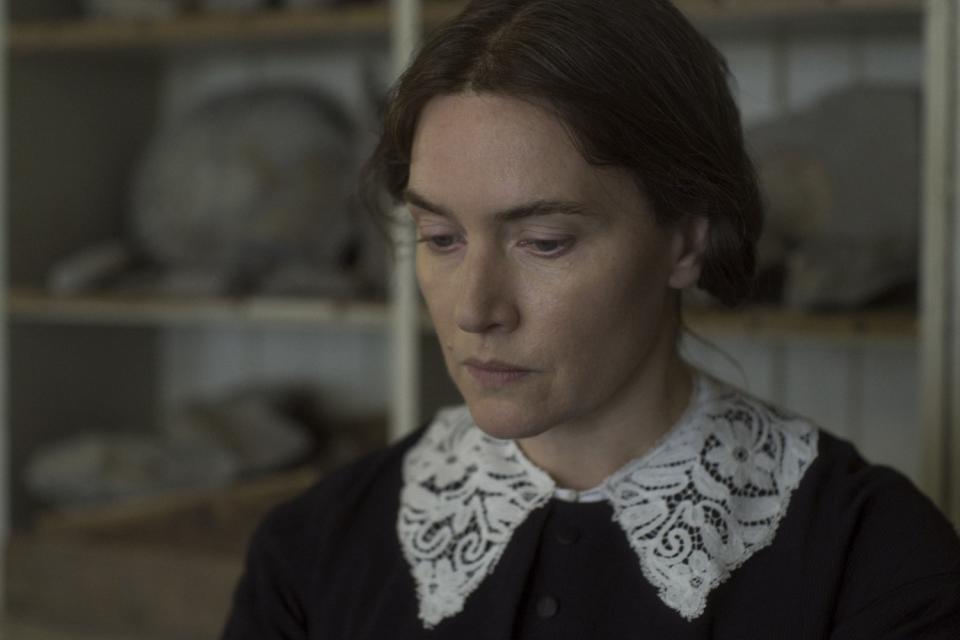Francis Lee on making 'Ammonite' with Kate Winslet and Saoirse Ronan

After a number of pandemic-related delays, the period romance “Ammonite” has been uncovered at last. Written and directed by Francis Lee, the film is set in 1840s Dorset, England. There the paleontologist Mary Anning (Kate Winslet) spends her time mostly alone by the seaside looking for fossils. After Charlotte Murchison (Saoirse Ronan) is unceremoniously left behind by her husband to convalesce in Anning’s care, the two women find themselves drawing closer, both brightened by the relationship.
The film brings together three celebrated artists. Lee, an actor turned filmmaker, won numerous prizes for his 2017 debut feature “God’s Own Country,” a queer romance set on a sheep farm. Winslet, along with her best actress Oscar win for “The Reader,” has six other Academy Award nominations. Ronan is a four-time Oscar nominee.
“Ammonite” was selected to be part of the Cannes Film Festival earlier this year and also the Telluride Film Festival in the fall, both of which were subsequently canceled. The film finally had its world premiere on Friday night as part of the Toronto International Film Festival. Earlier in the week Lee spoke on the phone from his home in Yorkshire, England, about the film.

There's been such anticipation since a first image of Kate and Saoirse together was released over a year ago. Has that put any added pressure on you in finishing the movie?
Francis Lee: This is only my second film. And I'm very lucky because I live very remotely, on the side of a hill in the middle of nowhere, in a wooden hut that has no cell reception. I don't go to film parties or anything like that, because obviously I live very far away from anything. And so I am quite protected from any kind of noise around the film, but I've been really excited and thrilled that people are really looking forward to seeing it. And I'm nervous obviously, but I'm more excited. I want to share the film with people.
As you were talking about “God's Own Country” it often came up that it was based on your life. What was the inspiration for the story of “Ammonite”?
Lee: Well, the thing with “God’s Own Country” is that it's not autobiographical in any way, shape or form, apart from the landscape where I grew up and where I live. With “Gods Own Country” I was exploring this idea of relationships and what it feels like to fall in love and what have you and “Ammonite” is a very personal film in terms of the emotional scope of it and those characters. So again I am exploring this idea of relationships and what have you. It's just that they're in the 19th century.
Did you do research into paleontology and the women of that era? How did you come to have the real-life figures of Mary Anning and Charlotte Murchison be part of the movie?
Lee: This is quite a long answer. So I was looking for a birthday present for my then-boyfriend and he really liked polished stones and fossils, and every time I looked for a fossil this woman's name kept coming up, Mary Anning. And so I started to read about her and I was instantly drawn to her because she was a working-class woman, born into a life of poverty in a very strict, patriarchal, class-ridden society where she rose to being the leading paleontologist of her generation, but totally unrecognized because of her gender and because of her class. And as a working-class queer filmmaker, I'm very obsessed by class and this idea of patriarchy and gender.
And at the same time, I read some research about female-and-female relationships of the 19th century, which are really quite well-documented through letters to each other, these really wonderful, passionate, loving letters that women would write that kind of illustrated these deep, emotional, passionate relationships. And I knew I never wanted to write a bio-pic about Mary Anning because there's virtually nothing written about her by contemporaries. Again, because she was this working-class woman. And so I wanted to use her story to inspire this love story and to be able to elevate her and to be able to give her a relationship with somebody I felt would be worthy of her. And, in this very patriarchal society, that didn't feel [like it should] be with a man, because men owned women and women were subject to men. I wanted to elevate this idea of who Mary Anning is. And so that's where all these things collided. And it's quite well-documented that Mary had friendships with women but there's no documentation that she ever had a relationship with a man. And so I just took that and interpreted it, to develop this vision of the Mary as I saw her.

What about casting Kate and Saoirse? Was it difficult to get two of the most highly regarded actresses of our day?
Lee: The short answer is that I never write with an actor in mind because I think it would be too devastating to then send it to that actor and that actor not be available or not want to do it. So I kind of try and keep an open mind. When I was thinking about, first of all, the role of Mary I knew I wanted to cast a British actor and I knew I wanted this actor to be in her 40s. And I'd always been drawn to Kate because there's such an honesty and truthfulness about her performances. And so very simply I sent her the script. Kate is wonderful at reading things. She read it the same day and the message came back on the same day she wanted to do it. So that was great. With Saoirse, I'd always been drawn to Saoirse’s work because she's so vibrant onscreen and again has such an honesty and a truth. I sent it to Saoirse and again, Saoirse read it and came back and wanted to do it.
And it was important to me because I like to work in a particular way with actors, which is quite a lot of character work before we start shooting and develop these characters from scratch. And both Kate and Saoirse were really open to really doing all that work. And part of that is to do the physical work of the character because I don't like any stunt doubles or hand doubles or anything. I like authenticity. So Kate went on those beaches on the South coast of England for weeks and weeks and weeks and got cold and wet and learnt and became incredibly proficient at fossil hunting and knowledgeable. And Saoirse had to learn how to play the piano and learn how to do needlepoint and all these things. Both of them totally threw themselves into it physically, which was just wonderful. And I think really adds an extra level of truth to the performances.
They make for such a great pairing onscreen. They each have this way of seeming both bottled-up and passionate at the same time.
That's so lovely to hear. Thank you. I agree. I think they complement each other perfectly. What was so great about working with them is that I like emotion that's very internalized rather than front-footed and it was great to see them both work in that sphere of internalized emotion and holding on to so much.
I certainly don't want to spoil anything, but I think the ending of the movie is something you’re going to get a lot of questions about. A whole rush of emotions plays across Kate’s face and it’s hard to read exactly. What did you like about an ambiguous ending?
Lee: I guess I wanted an ending that could be interpreted as hopeful. I don't know how much at first I can say. I guess what I like about stories is when you see a movie, I really like it when it feels like it's a snapshot of somebody's life, that you're dropped in to somebody's life at a certain point, not at the beginning, not at the end, but just at a certain point. And you go on this journey for however long that period of time is, and then you leave. And I guess I liked that idea that it felt like we were going through this immersive emotional story with these characters and that at the end, we were going to leave them, but these characters were going to carry on with their lives. And they were going to determine for themselves in a sense how that was going to play out.
With “God's Own Country,” you went through endless comparisons to “Brokeback Mountain” and with “Ammonite” people have been talking about the movie with regards to “Portrait of a Lady on Fire” or even already comparing it to “The World To Come,” which just premiered at Venice. How do you feel about that?
Lee: I think it's a really super-interesting question. I don't see queer films as a genre and in no other way do films get compared in this way. “Working Girl” and “An Officer and A Gentlemen” are never compared. And I think that it is somewhat difficult that as filmmakers, particularly those three films you just mentioned, each of those filmmakers, including myself, all made our films without any knowledge of the other making their films. And so I think that it only happens in queer cinema where films are compared like this.
And sometimes it feels like we're only allowed one film. I remembered in 2017 when “God's Own Country” came out, there was for the first time that I could remember, quite a few queer films, which I thought was a fantastic celebration. There was “[A] Fantastic Woman.” There was “Moonlight.” There was "God's Own Country,” there was “Beach Rats,” there was “Call Me By Your Name” and others. And for the first time, I think audiences had a real choice of the queer movie they wanted to see or they liked, or they wanted to go to or they could like all of them. And I think comparing them so directly is difficult.
To me it feels regressive. And I'm confused why you're only allowed to like one. Why can't you like them all? And as I say, in heterosexual cinema, how many films will be made this year that are contemporary heterosexual romances or thrillers or horror, and those films won't be compared like that. I don't think queer cinema is a genre. I think it's more expansive than that. I think they fall into other categories — love stories, thrillers, romcoms, horror. It's a mystery to me.

